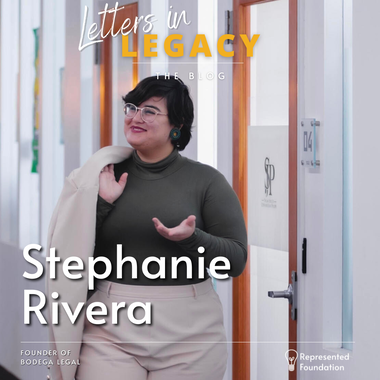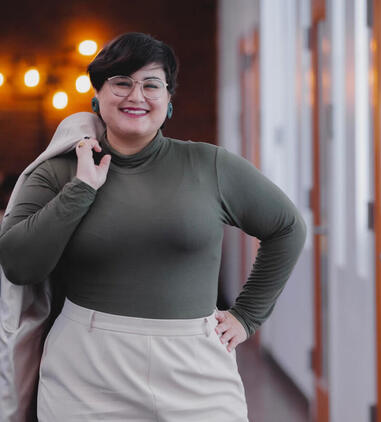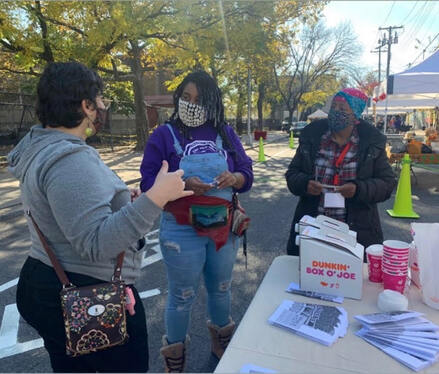|
Letters in Legacy: Stephanie Rivera pt 2 In our first installment of this interview I explained about sitting down with Stephanie Rivera, a Latina entrepreneur, advocate, and a practicing litigator in New York. In this half, Stephanie talked to me about identity, imposter syndrome and the Legacy she’s creating. When I asked Stephanie what celebrating her own heritage during Hispanic Heritage month she clarified that she identifies as Nuyorican. While being proud of her Puerto Rican identity, being a New Yorker, she says helped her become the woman she is today. “I think more than anything that has crafted who I am and how I turned out, and being around community members that are so diverse, and growing up in predominantly black neighborhoods, and finding commonality again, like, we're in this struggle together, and I'm gonna get free, you're gonna get free, and we just going through this together.” Esquire bound: When I asked Stephanie to talk more about why she decided to become a lawyer, she told me “[What] sealed the deal for me in terms of going to law school was coming back from college, and was like, I can't afford to live where I grew up. My family can't afford to live here, and they're running out of options. My community members are running out of options.” Continuing, she explained to me what it's like to be a Latina working in the legal field. “There's this false narrative that the law is neutral and blind, right? To color, to race, to gender, and actually, it's not blind at all. It is actually very visible and very skewed. So how do we bring our lived experiences into the law to make it more applicable and equitable? And I think, especially for Latinas in the law, we have to recognize that we're representing so many different identities, we're representing our gender, we're representing our national origin, and our race but also that we have a duty to other people who are in the struggle… Even though sometimes it's really hard, because we're going up against systems that really have that ingrained in them. When I asked her why it was important for a Latina woman to be a lawyer, she told me: “Whether it's going to court being in front of a justice, where you're assumed to be an interpreter, or you're assumed to be, a clerical person, and you're like No, I'm actually, the lawyer here. So I think it's important that we get seen and heard in both ways.” Dealing with Imposter Syndrome: Imposter syndrome stems from doubting one’s skills and accomplishments in fear of being exposed as a fraud. For Stephanie she’s battled the emotion becoming the first lawyer in her family, and even continues in deciding to pursue her business full-time. She’s always passionately felt that staying on as an attorney in another organization was super important to her to be able to grow Bodega Legal. “It's hard,” she said, “ I felt like I wish there was more that I have done already. But I still stand by my decision to continue to grow in my legal experience so that when I finally transition, I'll feel competent,” wanting to gain all the skills and knowledge before transitioning to working full time at Bodega Legal. When I asked her to talk about where else she sees imposter syndrome come up she told me: “I think there's some major impostor syndrome. Being (from) a household generationally where people get a job, and that's their job for life. So being someone that steps away from that, it's really difficult. My mom was a construction worker, my grandmother was a factory worker, my dad is in construction, and people just work for other people doing the same thing. And (have) the idea that work has to be hard, and you have to work hard. It's a concept that I'm always going back and forth on….” Her legacy:
When asked what she would like her legacy to be, she expands on her wish to be a supporter to the people. She wants to be remembered as always being there for you and always being able to have your back no matter what. “I always tell people that my superpower is to be a supporter. Which is why being a litigator feels sometimes at odds with who I am as a person, because I don't like being front and center. But I always want to make sure that people feel supported, people feel seen, people feel heard. And they know that, I see them, and I'm going to do whatever I can to make their visions a reality. So I always say, I'm your supporter, I'm there, I'm your cheerleader, and we're gonna make it happen. So I think more than anything, that's what I want my legacy to be. Like, no matter what business or field I'm in, Stephanie has her back.” If you want to help other entrepreneurs like Stepahnie grow their organization then sign up for our new round of service groups coming this fall. Service Groups offer a unique symbiotic approach to volunteering and support, because everyone benefits! Represented partners Entrepreneur Supporter Organizations and corporations who prioritize employee volunteering strategies, to offer an online volunteer platform connecting Black and Brown social entrepreneurs with teams of high-skilled support for 10-12 week projects. Click here to read more about Service Groups coming this winter!
0 Comments
Leave a Reply. |
About UsRepresented Foundation's mission is to close the diversity gap in social impact leadership. Archives
July 2023
Categories |
Your charitable donations grow our community for Black and Brown social entrepreneurs.
Represented Foundation is a 501(c)3 nonprofit organization
Tax ID# 82-1686527
Represented Foundation is a 501(c)3 nonprofit organization
Tax ID# 82-1686527
© Represented Foundation. All rights reserved.




 RSS Feed
RSS Feed